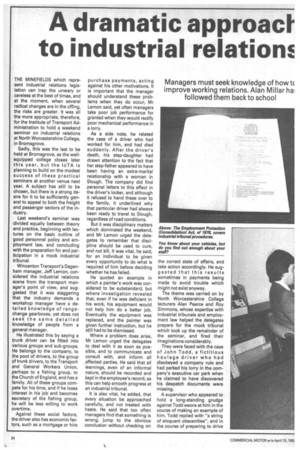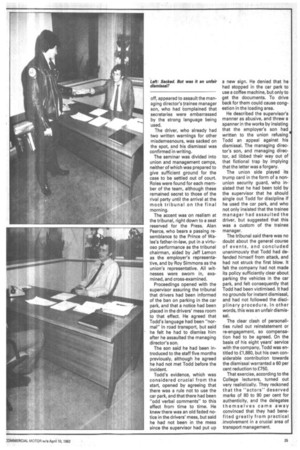A dramatic approact to industrial relatiom
Page 18

Page 19

If you've noticed an error in this article please click here to report it so we can fix it.
Managers must seek knowledge of how tc improve working relations. Alan Millar ha followed them back to school
THE MINEFIELDS which represent industrial relations legislation can trap the unwary or careless at the best of times, and at the moment, when several radical changes are in the offing, the risks are greater. it was all the more appropriate, therefore, for the Institute of Transport Administration to hold a weekend seminar on industrial relations at North Worcestershire College, in Bromsgrove.
Sadly, this was the last to be held at Bromsgrove, as the wellequipped college closes later this year, but the loTA is planning to build on the modest success of these practical seminars at another venue next year. A subject has still to be chosen, but there is a strong desire for it to be sufficiently general to appeal to both the freight and passenger sectors of the industry.
Last weekend's seminar was divided equally between theory and practice, beginning with lectures on the basic outline of good personnel policy and employment law, and concluding with the preparation for and participation in a mock industrial tribunal.
Wincanton Transport's Dagenham manager, Jeff Lemon, considered the industrial relations scene from the transport manager's point of view, and suggested that it was staggering that the industry demands a workshop manager have a detailed knowledge of rangechange gearboxes, yet does not seek the same detailed knowledge of people from a general manager.
He illustrated this by saying a trunk driver can be fitted into various groups and sub-groups. He belongs to the company, to the pool of drivers, to the group of trunk drivers, to the Transport and General Workers Union, perhaps to a fishing group, to the Church of England, and has a family. All of these groups compete for his time, and if he loses interest in his job and becomes secretary of the fishing group, he will be less willing to work overtime.
Against these social factors, the driver also has economic factors, such as a mortgage or hire purchase payments, acting against his other motivations. It is important that the manager should understand these problems when they do occur, Mr Lemon said, yet often managers take poor job performance for granted when they would rectify poor mechanical performance in a lorry.
As a side note, he related the case of a driver who had worked for him, and had died suddenly. After the driver's death, his step-daughter had drawn attention to the fact that her step-father appeared to have been having an extra-marital relationship with a woman in Slough. The company did find personal letters to this effect in the driver's locker, and although it refused to hand these over to the family, it underlined why that particular driver had always been ready to travel to Slough, regardless of road conditions.
But it was disciplinary matters which dominated the weekend, and Mr Lemon urged the delegates to remember that discipline should be used to cure, and not kill. It was vital, he said, for an individual to be given every opportunity to do what is required of him before deciding whether he has failed.
He quoted an example in which a painter's work was considered to be substandard, but where investigation revealed that, even if he was deficient in his work, his equipment would not help him do a better job. Eventually the equipment was replaced, and the painter was given further instruction, but he still had to be dismissed.
Where a problem does arise, Mr Lemon urged the delegates to deal with it as soon as possible, and to communicate and consult with, and inform all affected parties. He said that all warnings, even of an informal nature, should be recorded and kept in the employee's record, as this can help smooth progress at an industrial tribunal.
It is also vital, he added, that every situation be approached carefully, and not treated with haste. He said that too often managers find that something is wrong, jump to the obvious conclusion without checking on the correct state of affairs, and take action accordingly. He suggested that this results sometimes in payments being made to avoid trouble which might not exist anyway.
The theme was carried on by North Worcestershire College lecturers Alan Pearce and Roy Simmons, whose expertise with industrial tribunals and employment law helped the delegates prepare for the mock tribunal which took up the remainder of the seminar, and fired their imaginations considerably.
They were faced with the case of John Todd, a fictitious haulage driver who had disobeyed a company rule and had parked his lorry in the company's executive car park when he claimed to have discovered his despatch documents were missing.
A supervisor who appeared to hold a long-standing grudge against Todd swore at him in the course of making an example of him. Todd replied with "a string of eloquent obscenities", and in the course of preparing to drive off, appeared to assault the managing director's trainee manager son, who had 'complained that secretaries were embarrassed by the strong language being used.
The driver, who already had two written warnings for other misdemeanours, was sacked on the spot, and his dismissal was confirmed in writing.
The seminar was divided into union and management camps, neither of which was prepared to give sufficient ground for the case to be settled out of court. Roles were found for each member of the team, although these remained secret to those of the rival party until the arrival at the mock tribunal on the final morning.
The accent was on realism at the tribunal, right down to a seat reserved for the Press. Alan Pearce, who bears a passing resemblance to the Prince of Wales's father-in-law, put in a virtuoso performance as the tribunal chairman, aided by Jeff Lemon as the employer's representative, and by Roy Simmons as the union's representative. All witnesses were sworn in, examined, and cross-examined.
Proceedings opened with the supervisor assuring the tribunal that drivers had been informed of the ban on parking in the car park, and that a notice had been placed in the drivers' mess room to that effect. He agreed that Todd's language had been "normal" in road transport, but said he felt he had to dismiss him after he assaulted the managing director's son.
The son said he had been introduced to the staff five months previously, although he agreed he had not met Todd before the incident.
Todd's evidence, which was considered crucial from the start, opened by agreeing that there was a rule not to use the car park, and that there had been "odd verbal comments" to this effect from time to time. He knew there was an old faded notice in the drivers' mess, but said he had not been in the mess since the supervisor had put up
unfair a new sign. He denied that he had stopped in the car park to
use a coffee machine, but only to get the documents. To drive back for them could cause congestion in the loading area.
He described the supervisor's manner as abusive, and threw a spanner in the works by insisting that the employer's son had written to the union refusing Todd an appeal against his dismissal. The managing director's son, and managing director, ad libbed their way out of that fictional trap by implying that the letter was a forgery.
The union side played its trump card in the form of a nonunion security guard, who insisted that he had been told by the supervisor that he should single out Todd for discipline if he used the car park, and who not only insisted that the trainee manager had assaulted the driver, but suggested that this was a custom of the trainee manager.
The tribunal said there was no doubt about the general course of events, and concluded unanimously that Todd had defended himself from attack, and had not struck the first blow. It felt the company had not made its policy sufficiently clear about parking the vehicles in the car park, and felt consequently that Todd had been victimised. It had no grounds for instant dismissal, and had not followed the disciplinary procedure. In other words, this was an unfair dismissal.
The clear clash of personalities ruled out reinstatement or re-engagement, so compensation had to be agreed. On the basis of his eight years' service with the company, Todd was entitled to £1,880, but his own considerable contribution towards the dismissal warranted a 60 per cent reduction to £750.
That exercise, according to the College lecturers, turned out very realistically. They reckoned that the "actors" deserved marks of 80 to 90 per cent for authenticity, and the delegates themselves came away convinced that they had benefited greatly from practical involvement in a crucial area of transport management.




















































